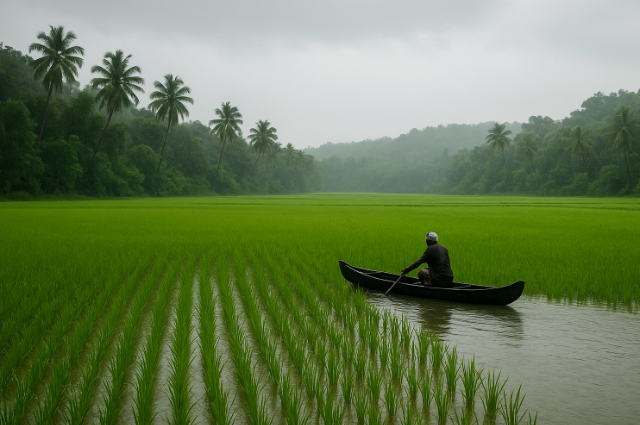
As always, it’s my mom who suggested the topic. She said “country,” but I quietly changed it to “state.” My state. Kerala.
I am a Malayali, and I say that with an odd mix of pride and exhaustion. Pride because it’s home. Exhaustion because people keep calling it “God’s own country,” as if that’s all there is to it. The tagline works, sure. It’s on every tourism ad, every glossy photo of backwaters and palm trees. But Kerala is more than a postcard. It’s chaos wrapped in calm, it’s sweat and rain and coconut oil and politics. It’s home.
They used to call it the land of spices. A tiny strip of land on the map, yet everyone wanted a piece of it. British, Portuguese, Dutch, Arabs - they all came. To trade, to rule, to plunder. History books say Vasco da Gama was the first European to reach India by sea. He landed at Kappad, near Calicut, in 1498. That’s not far from where my family is from. Sometimes I imagine that shore, quiet and unsuspecting, as the sails appeared on the horizon. One man stepping down, changing everything that came after. Funny how the sea brings both gifts and grief.
Kerala is green. So green that sometimes it feels unreal. When it rains - and it rains a lot - the whole land seems to breathe. The soil smells alive. The trees lean closer. There’s a tenderness in the air, like the world is being washed clean again. You feel it in your chest. Warmth, softness, something like belonging.
And then there are people. Loud, opinionated, political, hospitable. We argue about everything. Politics, cinema, food, cricket. Especially politics. Kerala’s political landscape is almost a character of its own. No right-wing dominance here. The left holds strong. There are no BJP MPs from Kerala even now. It’s not utopia, but we try. 100% literacy, strong health indicators, high human development index - we love quoting numbers like they’re trophies. Maybe they are.
But the real pride of Kerala isn’t in its stats. It’s in how ordinary people live together. We are secular in a way that’s not performative. It’s not a slogan. We just… coexist. My best friends growing up were Muslim, Christian, Hindu - it never mattered. We celebrated each other’s festivals without thinking twice. Eid biriyani, Christmas cake, Vishu payasam. Nobody asked who’s fasting or praying. We just ate.
And then, of course, there’s Onam. Our collective festival. The one that belongs to everyone. The story goes like this: Once there was a great king named Mahabali. Under his rule, there was no hunger, no inequality, no theft, no sorrow. People loved him so much that even the gods grew jealous. Lord Vishnu came down as a dwarf - Vamana - and asked for three feet of land. Mahabali agreed. And the Vamana grew gigantic. With one step, he took the earth. With the second, he claimed the heavens. There was nowhere left for the third. Mahabali offered his own head. Before being pushed into the netherworld, he asked for one thing - to visit his people once every year. That’s Onam. The day our king returns. The day everyone, regardless of caste, class, or faith, celebrates equality, abundance, and love.
Every Onam, the air smells of flowers and fried banana chips. Homes are decorated with floral carpets. Kids in white and gold dance to the same old tunes. For a moment, everything feels suspended. I sometimes wonder if Mahabali really visits us or if it’s just nostalgia pretending to be memory. Either way, it’s beautiful.
Kerala is contradictions stitched together. We are both traditional and radical, spiritual and political, slow and intense. Women in white sarees with golden borders marching in protests. Fishermen saved flood victims before the government could act. Toddy shops standing next to libraries. A poet on a local train reciting under his breath. A nurse from Kozhikode is working night shifts in Germany. Every Malayali has a story that travels.
Of course, not everything is perfect. There’s hypocrisy, patriarchy, floods, and unemployment. But we fight. And when we can’t fight, we write. Or we sing. Or we drink tea in tiny glasses by the road and keep talking. We love to talk. That’s our politics too - endless conversations over chai, under rain, in the middle of life.
Kerala, for me, is a rhythm. It’s not just a place, it’s a pulse. When I’m away too long, I start craving its sounds - the ceiling fan hum during afternoon naps, the prayer calls echoing with the church bells, the rain hitting the roof like it has somewhere to be. The place has texture. It sticks to you.
Sometimes I think the gods made Kerala on a day they were feeling sentimental. Too much green, too much water, too much heart. They gave us everything - and maybe that’s why we never stop questioning, never stop arguing. We were born political.
When I think of Kerala now, I don’t just see the land. I see my mother making tea on humid mornings. I see the old women on verandas gossiping over the news. I see young people protesting in universities, holding placards and poems. I see fishermen rowing through flooded streets carrying strangers to safety. I see hands joined across faith and difference, building, surviving, remembering.
That’s Kerala to me. Not just God’s own country. People’s own country.
